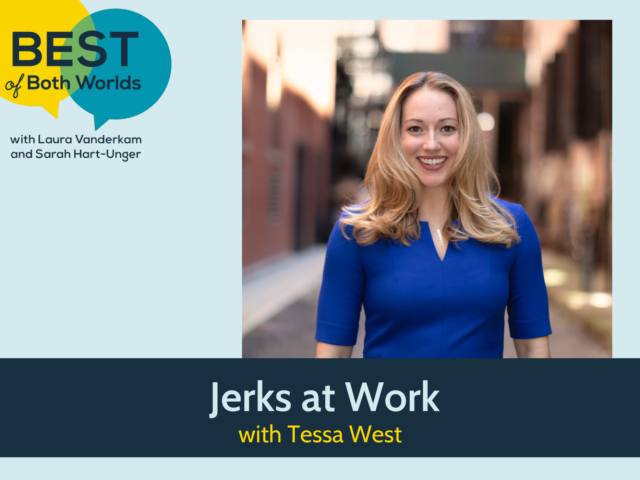Ideally all your co-workers are wonderful. Probably many are! But there are always those folks who are more difficult to deal with. Nothing necessarily rises to the level of justifying a formal complaint to HR. But day to day interactions can be miserable.
Tessa West, an NYU social psychologist and author of the new book Jerks at Work: Toxic Coworkers and What to Do About Them, joins us for this episode of Best of Both Worlds to discuss strategies. From Free Riders to Credit Stealers to Bulldozers, she’s got a full taxonomy, and ways to deal with each. I particularly like the idea of “fairness checks” for group work. You set group norms for very clear assignments. And then, instead of calling out the slacker, you praise people who did unexpected extras — which makes it very clear whose workload they had to pick up.
In the Q&A section, Sarah and I address a question from someone who is most definitely not a jerk at work. A scientist running a major research lab is trying to figure out how to help her students and postdocs set and reach their goals. How can you best mentor folks for whom the goal-setting process doesn’t feel natural?
Please give the episode a listen! And let us know if there are other work-related topics you’d like to see us cover.


This was a great episode! A lot of what was mentioned is also relevant to volunteer organizations as well- I am on the council of a religious organization and much appreciated some of the suggestions for strategies. Jerks and free-riders are everywhere, including houses of worship.
@Anon- they are indeed everywhere! Anywhere you will find humans…
Hi Laura, what are ur thoughts on companies wanting employees back in office, just because they think that will bring economy back. “Fill our great downtowns”.
@Megan – I’m not sure that’s a particularly helpful way for a company to think about it. The question is more what sort of work is best done in person and what is best done remotely. Most people have now found that 5 days a week in person is overkill, but there are certainly things that are easier to do face-to-face. So if an organization can think about presence purposefully, they’ll find that people will come in some days. Just not as many as before.